

Last year Walmart commissioned a study on itself, and now its findings can be revealed: Walmart is the greatest thing since penicillin. More specifically, the study sees the chain-store titan’s widening footprint on America’s retail landscape as a gift for the communities lucky enough to have a Supercenter land on them.
The research, conducted by the Hatamiya Group, a Davis-based firm owned by Lon Hatamiya, is predicated on a comparative analysis of taxable retail sales and retail business permits, and reaches two conclusions: “On average,” California communities with Walmart Supercenters in them have fared better economically than those without them.
Of course, while it may be difficult to name a community that doesn’t have a Walmart in it, California is a very large state and has places where even Walmart won’t tread – economic no-go zones that have been especially hard-hit by the recent recession and slow recovery.
» Read more about: Walmart’s New Research: A Flattering Self-Portrait »
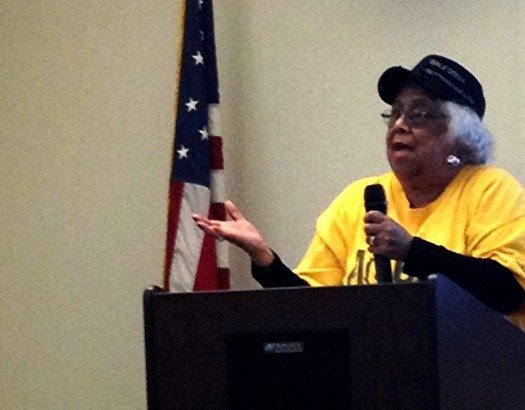
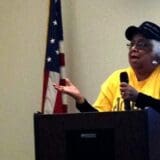
The Alliance of Californians for Community Empowerment (ACCE) held a town hall meeting February 6 to discuss its new Fix Unemployment Now campaign, which aims to make unemployment insurance more accessible in light of recent problems with California’s Employment Development Department (EDD). The meeting, which took place at Service Employees International Union (SEIU) Local 721’s headquarters in Los Angeles, drew members of ACCE and SEIU, EDD employees and members of the community. (Full Disclosure: The author of this article has previously volunteered for ACCE.)
Fix Unemployment Now primarily addresses EDD’s failure to provide unemployment checks on time and to answer claimants’ questions and concerns. According to ACCE, these problems are related to EDD’s decision to outsource a computer upgrade to Deloitte Consulting, a company that has been fired by other public contractors in the past. According to the Los Angeles Times, EDD is so unresponsive that it answers only a fraction of the phone calls it receives.
» Read more about: Campaign Targets California’s EDD Failure »


We Americans don’t like to think of our country as corrupt – or at least as corrupt as Japan, whose yakuza crime syndicates have taken over much of the legitimate business sector, including providing materials for the Fukushima nuclear reactor and scooping up homeless people to work as cleanup crews there. Of course we’re not like India, where things only get done with a bribe. And hopefully we’re not as bad as Russia, where this year’s Winter Games have been called “the most corrupt in Olympic history.”
Still, corruption sure feels pervasive here. Last year the people who run the banks, insurance companies and stock brokerages contributed $10 million to the legislators who sit on the House Financial Services Committee. That body makes the rules for the finance industry. Known as a “juice committee” because membership is so lucrative, House leaders added 61 more positions to the panel, because so many Congressmen wanted to sit on it.


Last week’s testimony in the Vergara v. California trial raised many an eyebrow when Los Angeles Unified School District (LAUSD) Superintendent John E. Deasy testified on behalf of plaintiffs in a lawsuit whose defendants had originally included LAUSD.
Despite its supporters’ protests to the contrary, Vergara is widely seen as a frontal attack against statutory guarantees of due process and seniority rights for state teachers. The suit is the brainchild of Students Matter, a Bay Area nonprofit created by wealthy Silicon Valley entrepreneur David Welch and partly financed by L.A. billionaire Eli Broad.
Under friendly direct examination by plaintiff attorney Marcellus McRae, the superintendent offered testimony that supported the suit’s contentions that the way in which teachers are fired, laid off and granted tenure has an adverse impact on the overall quality of the teacher workforce and illegally discriminates against low-income and minority students.
» Read more about: Deasy v. Deasy: The Two Faces of L.A.’s School Superintendent »
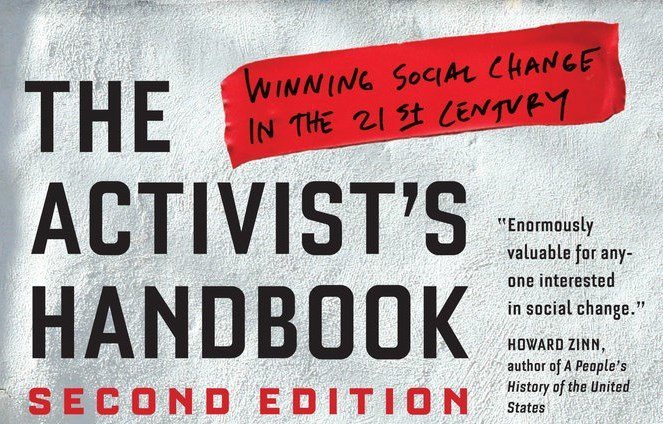
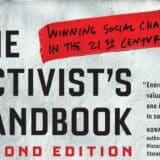
Randy Shaw does not fit the rabble-rouser profile. An upper-middle-class native of West Los Angeles, he came to San Francisco in 1979 to enroll in the city’s prestigious Hastings Law School, whose downtown campus is part of the University of California, Berkeley. There, however, he discovered that his school had for years been expanding by swallowing up residential hotels catering to low-income residents in the adjacent Tenderloin district.
“It used to be,” Shaw remembers, “that if you wanted to evict someone in the Tenderloin you’d throw them down a flight of stairs. Then it became more civilized: You’d just threaten to throw them down a flight of stairs.” In 1980 he co-founded the Tenderloin Housing Clinic as a legal aid resource for neighborhood residents. But it soon grew into an aggressive grassroots organization battling developers who wanted to replace much of the Tenderloin with luxury tourist hotels.


The Partnership for Working Families Summit kicked off Tuesday in Los Angeles as activists from around the country convened at the Biltmore Hotel for three days of workshops and talks focused on creating good jobs, sustainable industries and strong unions.
The Partnership includes such groups as the Los Angeles Alliance for a New Economy (LAANE), Puget Sound Sage and the Alliance for a Greater New York (ALIGN). While attendees came from a range of organizations and campaigns, the idea that cities can be platforms for change provided a common thread. As Leslie Moody, the Partnership’s outgoing executive director, put it in her opening remarks, “Cities matter.”
Moody pointed to the new set of progressive mayors taking office across the U.S., but added that elected leaders do not act alone. She cited the way communities have pushed new civic officials to follow through with constructive policies.
“We’re not going to wait for federal change,” Moody said,


Every January, our state celebrates the work and legacy of Dr. Martin Luther King Jr., a hero who sacrificed his life in the fight to end discrimination and poverty in America. In this respect, it seems appropriate that January is also the month when our Governor releases his budget proposal. The State Budget is more than numbers; it reflects our collective priorities and funds what is most important. Sadly, this budget proposal fails to honor Dr. King and his fight for justice. Within the Governor’s proposal are further cuts to critical social service programs. There is no clearer or more tragic example of this disinvestment than our state’s willingness to cut access to state-sponsored child care for low income families. In the name of justice and equality, we ask the Governor to fully fund child care to ensure universal access to all and quality work conditions for providers.
Currently we have more than 300,000 children languishing on waiting lists,
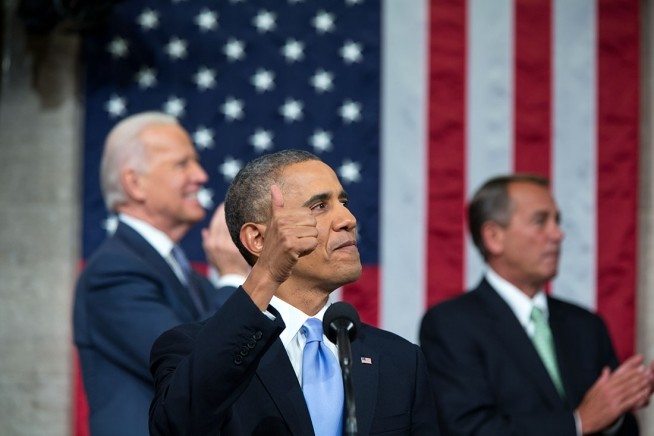

There was something tantalizing about Barack Obama’s State of the Union speech last night. When was the last time an American president talked about the simple human cruelty of our Dickensian sick leave and maternity policies? Or told CEOs to just do the right thing and raise wages for their workers?
What made Obama’s speech compelling is that he did more than just issue platitudes — he announced his decision to use executive authority to increase the pay of workers employed by companies that contract with the federal government. That will mean a nearly $3 an hour raise for hundreds of thousands of people. In an era of Tea Party-engineered partisan gridlock over pretty much everything, that’s nothing less than a seismic shift.
So why didn’t the State of the Union address leave me popping the champagne and toasting to an impending economic realignment that would reverse the nation’s slide back to the same levels of inequality we faced before the Depression?
» Read more about: Obama’s Speech: So Close and Yet So Far »


Common wisdom says that the subject of economic inequality, while temporarily in vogue, is still a rhetorical minefield. In the half-century since Lyndon Johnson announced the beginning of a war on poverty, presidents have avoided even using the word “poverty,” for fear of turning off voters. And just as perilous as talking about poverty, apparently, is admitting that a policy tries to attack it through “redistribution.” That term, according to the New York Times, is “explosive,” even “toxic,” in America. It’s a word, says William M. Daley, the former Obama chief of staff, that “you just don’t use.”
There’s evidence, however, that many Americans favor a distribution of wealth and income that’s much more egalitarian than the one we have now. But conservatives believe, and not without justification, that many people also dislike the idea of government taking from some people in order to give to others.
» Read more about: Wealth and the Natural Distribution Myth »


Last week, the U.K. publication The Guardian used an interesting anecdote to describe the key finding of an Oxfam report on global inequality: The world’s 85 richest people now own more wealth than the planet’s poorest 3.5 billion people. All of the world’s wealthiest individuals, Guardian writer Graeme Wearden noted, “could squeeze onto a single double-decker” bus.
The ironic image of the super-rich riding a humble public bus is an apt metaphor for the socioeconomic quandary facing America before President Obama makes his 2014 State of the Union address tonight. Underinvestment in job creation, training, education and public services like transportation put middle-class success out of reach for many Americans, while at the other end of the spectrum, wealth has been concentrated in very few hands.
President Obama’s speech ought to address the central problems of economic inequality and deficit of opportunities and services for many Americans.


Last month two of L.A.’s richest men decided they needed to defend their wealth in a Los Angeles Times opinion piece. The headline read: “It Isn’t a Sin to Be Rich.”
Of course it isn’t. No one has said it was a sin to be rich in a very long time. After all, rich is a state of being. It’s greed that makes the list of cardinal sins.
Naturally, social critics and political figures have spoken about the shrinking middle class. They’ve talked about the social instability caused by the exponential growth of wealth and the relatively shrinking resources of the working poor. Even film makers have produced documentaries describing a few people’s wealth growing so exorbitantly that it virtually pauperizes the rest of us. So apparently the two rich guys felt the sting and decided they needed to defend their class.


Last week’s announcements about 2013 earnings by California’s largest public pension funds suggest the agencies may be making significant progress in shaking off the lingering after-effects of the 2008 stock market crash.
The California Public Employees’ Retirement System (CalPERS) said it rode a 25 percent run-up in stock prices to post a 16.2 percent gain for its 2013 portfolio — its best showing in a decade. For its part, the California State Teachers’ Retirement System (CalSTRS) reported an impressive 19.1 percent return on its 2013 investments, led by a 28 percent return on its stock holdings.
The announcements undoubtedly came as welcome news to the roughly 1.6 million California government workers and 860,000 public school teachers represented by the systems. Ever since the 2008 global financial meltdown, their pensions have been in the crosshairs of fiscal conservatives and anti-public pension activists who wish to see the employees’
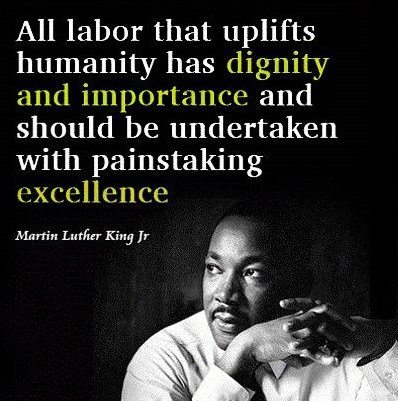
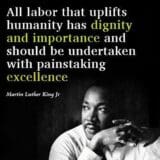
Last year, as we remembered the life and legacy of Reverend Dr. Martin Luther King, Jr., we focused much of our attention on the 50th anniversary of the March on Washington for Jobs and Freedom. We reflected on the historical words that followed, “I have a dream” and reaffirmed our commitment to keeping the dream alive.
We measured our progress through victories such as the end of Jim Crow segregation, the passage of the Civil Rights and Voting Rights Acts, and the election of our first African American President. We also talked about where we need to devote our efforts for the dream to become a reality.
With that, one year later we are reminded of the inequalities that still exist and the call to action we must all answer:


We all know the political shorthand: “red” states vote conservative while “blue” states vote progressive. But these days the deep red hue of Idaho, Arizona and Texas isn’t just a reflection of their political leanings; it’s all the red flags voters are raising about private prisons in those states.
In 1997, Corrections Corporation of America (CCA) took over the Idaho Correctional Center. Predictably, the facility was soon plagued with rampant violence, understaffing, gang activity and contract fraud committed by CCA. One former inmate said the facility was so violent that it was commonly referred to as “gladiator school.” What’s more, in 2012 the Associated Press showed that taxpayers didn’t even get the savings they were promised.
This month, tired of the bad headlines, Idaho Governor Butch Otter – a strong proponent of outsourcing – announced that the state is taking back control of the privately run prison.
» Read more about: States Are Regretting Prisons for Profit »
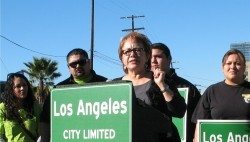
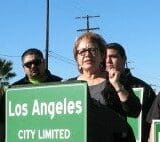
There was a time when we listened to science, leaned forward when its experts spoke about smoking, clean air and water, or the need for something called a seatbelt. But that was long ago, before corporate interests convinced us that the best policy for just about any social crisis was to do nothing. Today research surveys that statistically demonstrate the benefits of raising the minimum wage have about the same chance of being heard above the denial din as climate change papers.
Nevertheless, the authors of Effects of a Fifteen Dollar an Hour Minimum Wage in the City of Los Angeles, a new study conducted by the Economic Roundtable and funded by the Los Angeles County Federation of Labor, hope to open some very closed minds about these economic benefits. Tuesday the two groups released the study at a media event held on a corner of Lafayette Park.
» Read more about: 7.6 Billion Reasons to Raise L.A.’s Minimum Wage »
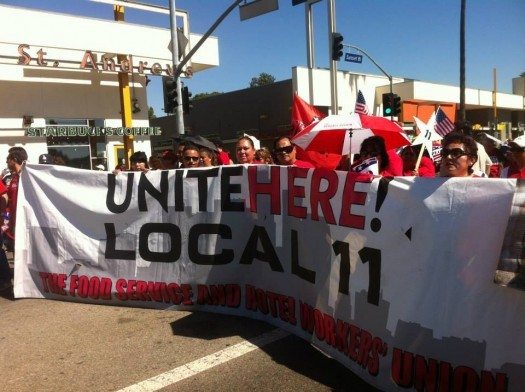

Today’s Los Angeles Times features front-page coverage of the Raise LA campaign, a new effort to improve the standard of living for workers employed by L.A.’s larger hotels. James Rainey’s piece, which appeared online late yesterday (as did a story on Raise LA by Nancy Cohen in The New Republic), noted that while a relatively small number of L.A. hotel workers enjoy the protections and benefits of union membership, most of the city’s hotel housekeepers, busboys and maintenance workers are mired in jobs that pay little more than California’s minimum wage of $8 per hour. Raise LA aims to create an hourly minimum wage of $15.37 for employees who work at hotels with of 100 rooms or more.
In 2012 Long Beach voters passed a similar law for its hotel workers, increasing their minimum wage to $13 an hour.
» Read more about: Minimum Wage Battle Checking in to L.A. Hotels »


Late Monday afternoon California Attorney General Kamala Harris released the state’s official title and summary for the ballot initiative promoted by San Jose Mayor Chuck Reed and others to reduce the retirement benefits of state and municipal workers. Harris’ wording had been anxiously awaited by Reed and his colleagues. In 2012 a different group of pension-cutters abandoned their measure, according to the Sacramento Bee, after they tested Harris’ summary and found it would make their measure radioactive at the polls.
Reed had called his proposal the Pension Reform Act of 2014 and, no doubt, had his fingers crossed that it would appear that way on a future ballot. If so, he was in for a disappointment, as the attorney general rebranded the measure as the less lyrical Public Employees Pension and Retiree Healthcare Benefits Initiative Constitutional Amendment. To the pension-cutters’ further chagrin, Harris’ description placed teachers,
» Read more about: Can Chuck Reed’s Pension-Cutting Campaign Get Off the Ground? »


The holiday interlude brought a mixed blessing from Seattle —that’s the positive spin, frankly—in the form of King County Superior Court Judge Andrea Darvas’ ruling in the SeaTac minimum wage case. The complaint, officially named BF Foods v. City of SeaTac, concerns Proposition 1, a ballot initiative adopted by the voters of the City of SeaTac last November, that raised wages to $15 an hour for airport and hotel workers.
Opposition to the measure was rather heated, as opponents sued to keep the matter off the ballot. Having failed in that endeavor, they spent big money to defeat it. Having lost, a recount, which did not change the results. After which, this suit.
The main litigant, according to press reports, is Alaska Airlines; they cleverly brought in the Port of Seattle, which runs the airport. The legal approach here was something of a kitchen sink strategy,
» Read more about: SeaTac Minimum Wage Law Faces Catch-22 Hurdles »


At a time when public sector workers and their unions are under constant attack, the heroic work of women and men who serve other people as a mission in life is often overlooked. The labor movement and Los Angeles lost a giant among these heroes with the recent passing of Eddie Reed. “Mr. Reed,” as I would always call him, lived the very definition of a public servant. For 34 years he helped the children and families of Los Angeles as a bus driver with the Los Angeles Unified School District.
“Bus driver,” however, is too narrow a description of the man and his mission. Mr. Reed was a leader who fought on behalf of a group of workers who were historically forgotten or marginalized whenever major decisions were made in the school district. He was a mentor to students, parents and employees, constantly reminding all of us that we have an obligation to serve those who have less or who struggle to find justice.
» Read more about: Eddie Reed: The Passing of a Labor Hero »
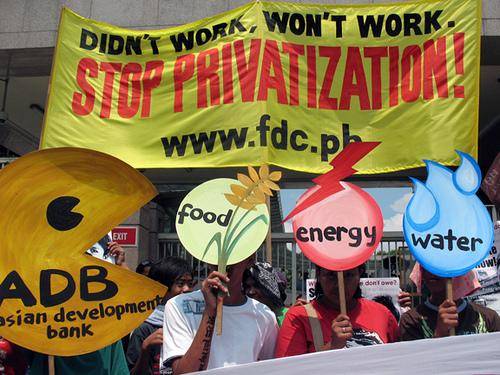

When future taxpayers look back to the moment they started taking back control of their schools, roads and services, they will look to 2013. From coast to coast, taxpayers rejected reckless outsourcing schemes. They held for-profit corporations accountable. And they said “no deal!” to CEOs who would put profits ahead of public health and safety.
These victories don’t always appear in the national media. But taken together they represent a real shift. Working together, I’m sure we will have many more in 2014.
Connecticut: Opponents of education privatization defeated three Bridgeport school board members who supported pro-charter schools superintendent Paul Vallas.
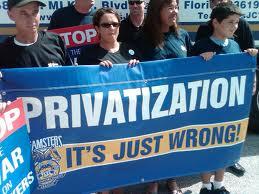 Idaho: Corrections Corporation of America left the state “after more than a decade marked by scandal and lawsuits surrounding its operation of the state’s largest prison.” Upon hearing the news, Spokesman Review columnist Shawn Vestal wrote,
Idaho: Corrections Corporation of America left the state “after more than a decade marked by scandal and lawsuits surrounding its operation of the state’s largest prison.” Upon hearing the news, Spokesman Review columnist Shawn Vestal wrote,
» Read more about: Outsourcing Wars: What the New Year Can Learn from 2013 »